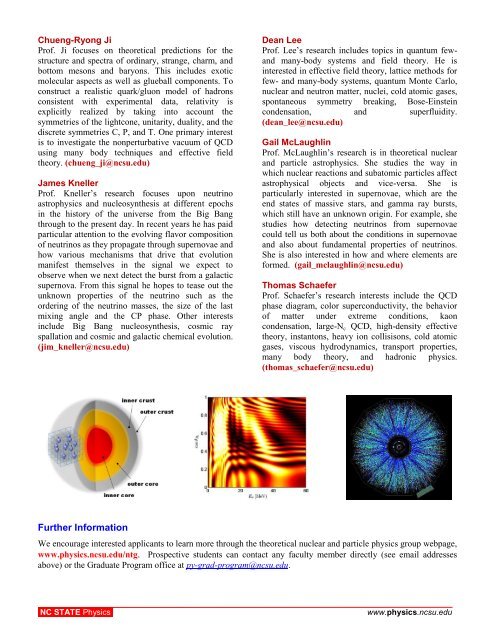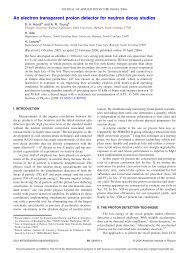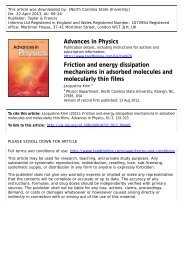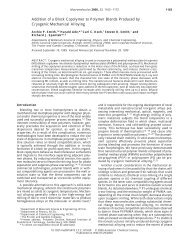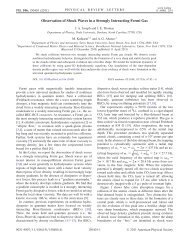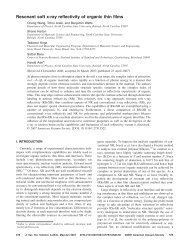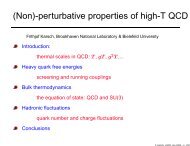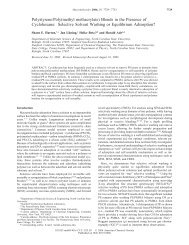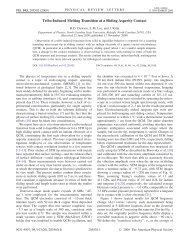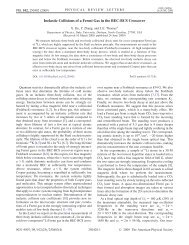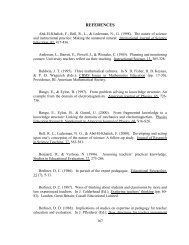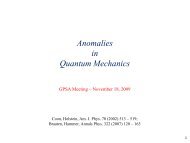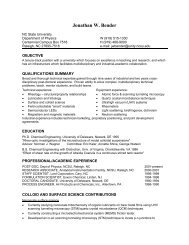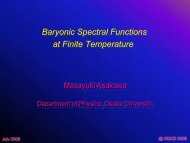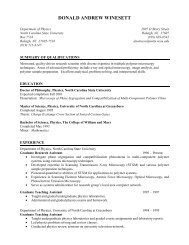Physics Graduate Brochure - Physics - North Carolina State University
Physics Graduate Brochure - Physics - North Carolina State University
Physics Graduate Brochure - Physics - North Carolina State University
You also want an ePaper? Increase the reach of your titles
YUMPU automatically turns print PDFs into web optimized ePapers that Google loves.
Chueng-Ryong Ji<br />
Prof. Ji focuses on theoretical predictions for the<br />
structure and spectra of ordinary, strange, charm, and<br />
bottom mesons and baryons. This includes exotic<br />
molecular aspects as well as glueball components. To<br />
construct a realistic quark/gluon model of hadrons<br />
consistent with experimental data, relativity is<br />
explicitly realized by taking into account the<br />
symmetries of the lightcone, unitarity, duality, and the<br />
discrete symmetries C, P, and T. One primary interest<br />
is to investigate the nonperturbative vacuum of QCD<br />
using many body techniques and effective field<br />
theory. (chueng_ji@ncsu.edu)<br />
James Kneller<br />
Prof. Kneller’s research focuses upon neutrino<br />
astrophysics and nucleosynthesis at different epochs<br />
in the history of the universe from the Big Bang<br />
through to the present day. In recent years he has paid<br />
particular attention to the evolving flavor composition<br />
of neutrinos as they propagate through supernovae and<br />
how various mechanisms that drive that evolution<br />
manifest themselves in the signal we expect to<br />
observe when we next detect the burst from a galactic<br />
supernova. From this signal he hopes to tease out the<br />
unknown properties of the neutrino such as the<br />
ordering of the neutrino masses, the size of the last<br />
mixing angle and the CP phase. Other interests<br />
include Big Bang nucleosynthesis, cosmic ray<br />
spallation and cosmic and galactic chemical evolution.<br />
(jim_kneller@ncsu.edu)<br />
Dean Lee<br />
Prof. Lee’s research includes topics in quantum fewand<br />
many-body systems and field theory. He is<br />
interested in effective field theory, lattice methods for<br />
few- and many-body systems, quantum Monte Carlo,<br />
nuclear and neutron matter, nuclei, cold atomic gases,<br />
spontaneous symmetry breaking, Bose-Einstein<br />
condensation, and superfluidity.<br />
(dean_lee@ncsu.edu)<br />
Gail McLaughlin<br />
Prof. McLaughlin’s research is in theoretical nuclear<br />
and particle astrophysics. She studies the way in<br />
which nuclear reactions and subatomic particles affect<br />
astrophysical objects and vice-versa. She is<br />
particularly interested in supernovae, which are the<br />
end states of massive stars, and gamma ray bursts,<br />
which still have an unknown origin. For example, she<br />
studies how detecting neutrinos from supernovae<br />
could tell us both about the conditions in supernovae<br />
and also about fundamental properties of neutrinos.<br />
She is also interested in how and where elements are<br />
formed. (gail_mclaughlin@ncsu.edu)<br />
Thomas Schaefer<br />
Prof. Schaefer’s research interests include the QCD<br />
phase diagram, color superconductivity, the behavior<br />
of matter under extreme conditions, kaon<br />
condensation, large-N c QCD, high-density effective<br />
theory, instantons, heavy ion collisisons, cold atomic<br />
gases, viscous hydrodynamics, transport properties,<br />
many body theory, and hadronic physics.<br />
(thomas_schaefer@ncsu.edu)<br />
Further Information<br />
We encourage interested applicants to learn more through the theoretical nuclear and particle physics group webpage,<br />
www.physics.ncsu.edu/ntg. Prospective students can contact any faculty member directly (see email addresses<br />
above) or the <strong>Graduate</strong> Program office at py-grad-program@ncsu.edu.<br />
.NC STATE <strong>Physics</strong>.<br />
www.physics.ncsu.edu


